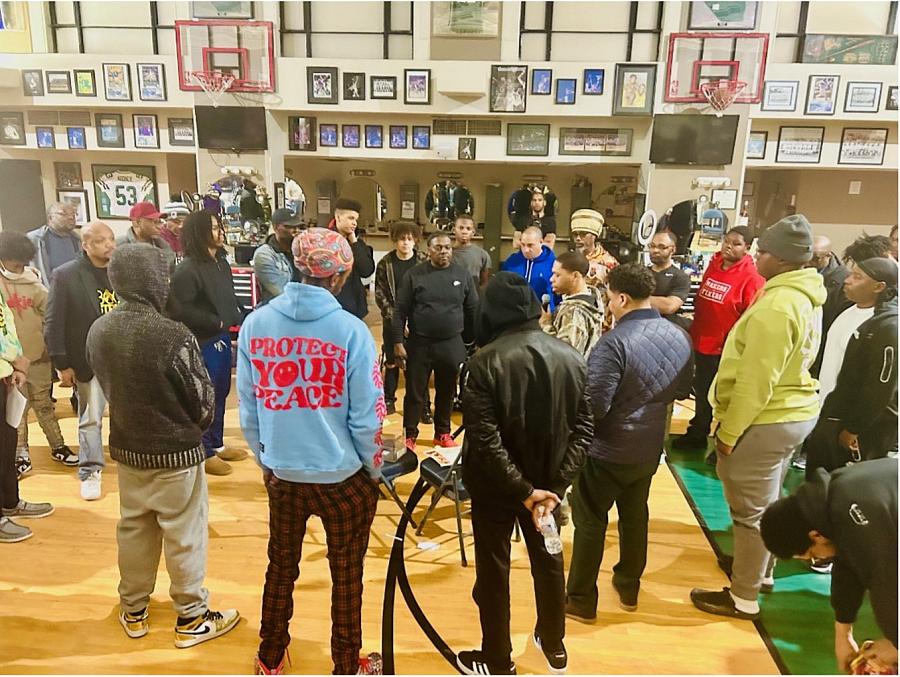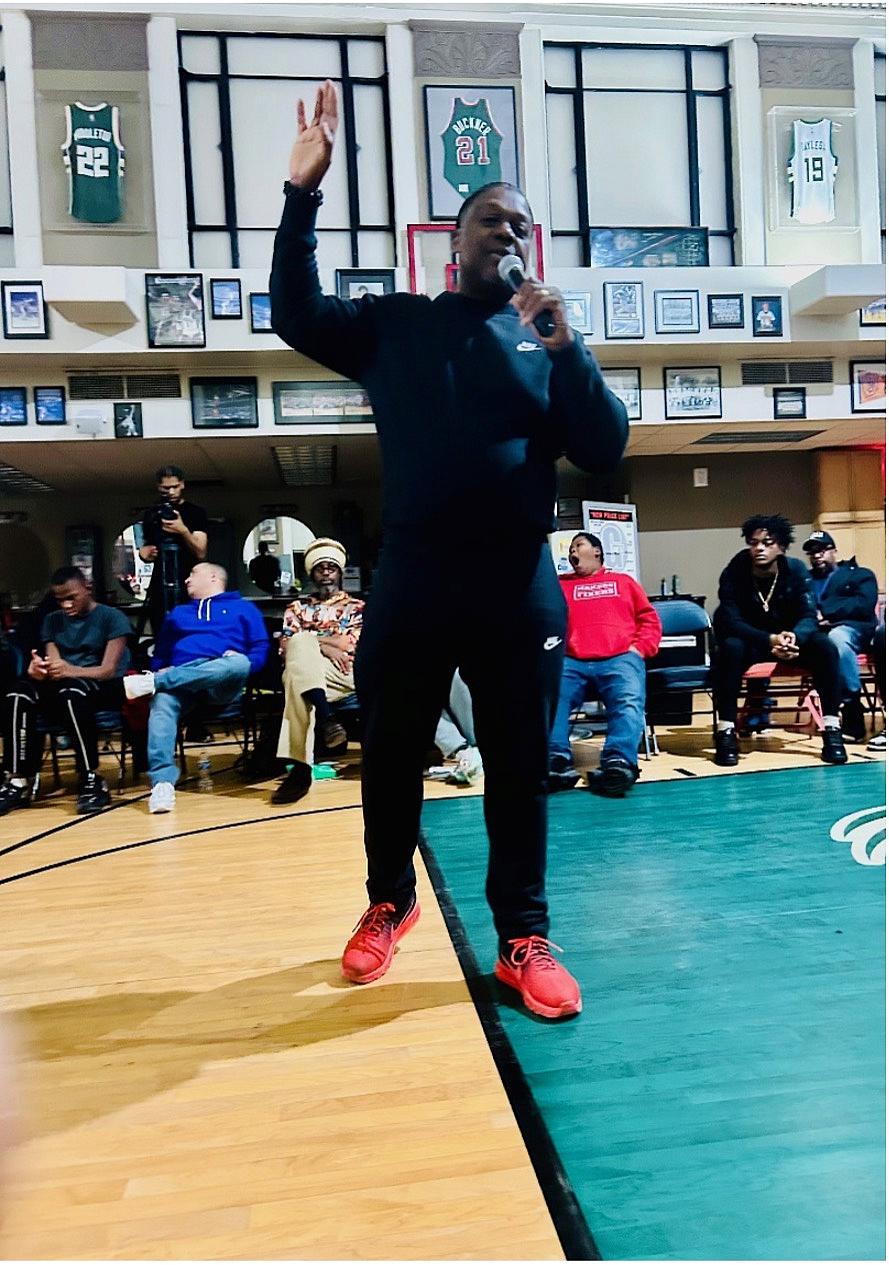The Health Divide: Black men need safe spaces to talk about pain and trauma

Kwabena Antoine Nixon addresses men at the monthly “Real Men, Real Talk” event at Gee’s Clippers in Milwaukee. About 50 Black men showed up at the barbershop to have deep conversations on various topics. The participants say these kinds of safe spaces are needed for Black men to be vulnerable without being judged.
Photo by James E. Causey
It’s 6 p.m. on a Monday, and about 50 Black men are seated in a circle inside a barbershop on Milwaukee’s Lower North Side. They are not getting haircuts or shaves. Instead, they cut to the root of their issues through safe, open, honest communication with other men.
Some of the problems have been bottled up for years.
The facilitator, Kwabena Antoine Nixon, a local community activist, award-winning poet, and author, leads “Real Men Real Talk” open conversation every third Monday of the month.
Before the heart-to-hearts took place, headshakes and hugs were shared as men introduced themselves to one another.
Nixon instructed the men: “I want you to look them in the eyes, dap them up, and say, ‘Hey King, I’m glad you could make it tonight.’ I know young people walk past each other in the streets and don’t acknowledge each other, but we are all kings and don’t do that.”
Over two hours, the men would discuss relationships with wives and girlfriends, divorce, friendship, friends lost to violence, bad relationships with their parents and siblings, and dealing with issues of racism and microaggressions in the workplace.
They would talk about their mistakes and how they strive to be great fathers. Some were more vocal than others, but nearly every person in the room co-signed on something they heard.
Across the country, Black men are seeking safe spaces for intimate conversations. Sharing their experiences is therapeutic, since it helps them know they are not alone. It is also affirming because they can be who they are and not worry about being judged.
“If you keep in these feelings and never get them out, it will harm your physical and mental health,” said Richard Badger, one of the participants.
‘How many of you have been told to get over your problems?’
Black people need their own spaces to gather where they can be free to talk openly about what they are going through, what they may be dealing with, and where they are not judged.
When people of color come together in a safe space, they can heal.
Safe spaces offer an alternative to many Black men who might not have access to professional one-on-one help, or feel comfortable seeking it out.
Only 26% of Black and Hispanic men between the ages of 18-44 who experience depression or anxiety were likely to seek mental health services, according to data from the National Health Interview Survey. In comparison, white men experiencing the same feelings were 45% more likely to seek out professional help.
A central issue is a lack of mental health care professionals.
An estimated 122 million Americans, or 37% of the population, lived in a mental health professional shortage area as of March 2023. According to USA Facts, the nation needs 6,398 mental health providers to fill these shortage gaps.

Near the end of the two-hour session, Kwabena Antoine Nixon asked the men who participated in the “Real Men, Real Talk” event to gather around him. He urged them to be safe and to continue having these conversations. He also told them to talk with mental health professionals if things got too overwhelming for them.
Photo by James E. Causey
Until these gaps are filled, groups like “Real Men Real Talk” will work to close the gap. The men who show up range in age from 17 to their late 60s.
During the February meeting, the men meditated together to clear their minds, and then Nixon asked them a series of questions and asked them to raise their hands if the question applied to them.
How many of you have been told to get over your problems?
Every hand went up.
How many of you have been told to be a man and suck it up, no matter what you were going through?
Every hand went up.
How many of you have used drugs and alcohol to numb the pain? Women? Or have you been angry and taken it out on other people?
Every hand went up.
How many of you have a bad relationship with your father?
Over half of the hands went up.
How many of you have no relationship with your father?
More than half the hands went up.
How many feel like nobody is listening to you when you are talking?
Nearly every hand went up.
“That’s why you’re here tonight. We are here to listen. We’re here to help,” Nixon said.
Black men need safe spaces to be vulnerable.
During the night, the conversations got deeper. A few men cried. Some talked about feeling betrayed by those they believed cared most for them.
Richard Badger broke the ice by sharing a story on how a man he grew up with was missing in action after Badger’s grandson was shot and killed last May.
“I got brothers in the room that were there for me better than he was, and I was friends with this man for 40-plus years. I had to cut him off. He wasn’t there when it happened and wasn’t there for me for the funeral or none of that,” Badger said.
To this day, Badger said he never understood why his friend was not there at one of the most challenging times of his life.
Nixon, playing devil’s advocate, asked if it was possible if his friend was so broken he just couldn’t be there.
Badger said no.
“If you can’t be there for the marathon, then at least be there during the sprint,” Badger said.
The men are open about their feelings because, usually, no media is allowed. Men are told to refrain from recording, and what is said in the room stays in the room. I was personally invited to the event by Nixon and others to share what takes place.
The men I talked to after the event said more safe spaces are needed for men of color.
“The main thing I heard tonight is that I’m not alone. Many men are going through the same things I’m going through,” said Terrance Moore Sr. “What I saw here tonight was men who are told to be tough all the time be vulnerable because they had a safe space to do it without judgment.”
Holding in that stress and pain affects not only your mental health but your physical health.
“If you don’t get it off your chest, it will eat away at you and cause all kinds of internal damage. Also, it will damage your soul and being,” Moore said.
Robert Parker, 23, called the meeting transformative.
“I feel better because I know I have a space to come to. I will be back at the next one for sure.”
In between the monthly meetings, some of the men are connected to Black mental health counselors. Those meetings are essential to breaking the cycle of pain.
Nixon, 54, said “Real Men Real Talk” was created with one thing in mind, “If you are a Black man, there is no place for you to nurture yourself.”
Most men go to the bar, have a drink, have a cigar, and hang out, but there are few spaces where a Black man can go and be unapologetically safe and cared for because you open up, he said.
“We acknowledge your pain, and we are going to hold you accountable for your actions,” Nixon said. “After that, I need you to be safe and well and know we got you.”

